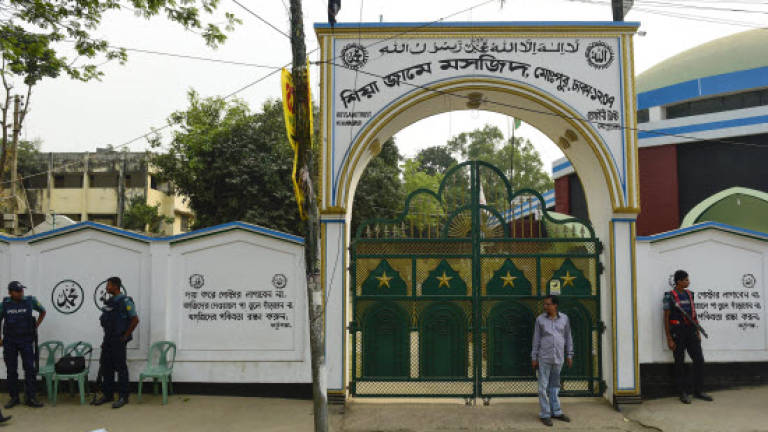IS claims deadly attack on Shiite mosque in Bangladesh

DHAKA: The Islamic State group claimed responsibility Friday for a deadly attack on worshippers at a Shiite mosque in northern Bangladesh, as fears grow of a rise in sectarian violence in the mainly Muslim country.
US-based monitoring organisation SITE reported the group, which has claimed responsibility for a number of recent attacks in Bangladesh, said it had targeted the Shiite worshippers.
Gunmen burst into the mosque in Shibganj, 125 km north of Dhaka, during early evening prayers on Thursday and opened fire on the gathered worshippers before fleeing.
"Allah enabled the soldiers of the Islamic State in Bangladesh to target a Rafidah Mushrikin temple (Shiite Mosque)," SITE, which monitors jihadist activity, quoted the Islamic State (IS) group as saying.
Police said the muezzin had been killed and three worshippers wounded in the shooting, a rare attack on minority Shiite Muslims in the mainly Sunni nation.
Detectives say they are questioning two people over the shooting, although they had not been formally arrested.
Television footage showed the heavily guarded Shiite mosque with broken windows and blood stains on the floor.
There are estimated to be around 2.2 million Shiite Muslims in Bangladesh, an officially secular but mainly Muslim country of 160 million.
Upsurge in militancy
Such attacks were until recently virtually unheard of in Bangladesh, which has a large population of mostly moderate Muslims but has suffered a recent upsurge in Islamic militancy.
The government says the jihadist group has no presence in Bangladesh and instead accuses the opposition of trying to destabilise the country of 160 million mainly moderate Muslims.
But Bangladesh has been plagued by unrest in the last three years, and experts have warned that a long-running political crisis has radicalised opponents of the government.
The mosque shooting came a day after police shot dead a top member of the banned local Islamist outfit Jamayetul Mujahideen Bangladesh accused of hurling grenades at the country's main Shiite shrine in Dhaka last month, killing two people.
That was believed to be the first attack on Shiites in Bangladesh, though banned Islamist militant groups have killed more than a dozen Sufi Muslims and attacked Hindus and Christians in the last two years.
IS has claimed a series of recent attacks, including the shooting of three foreigners, two of whom died, and the killing of a Sufi Muslim shrine chief this month.
But experts have expressed scepticism about the claims.
"Basically what is being described as IS attacks in South Asia including Bangladesh, these attacks have had no direct links with the IS," said Ajai Sahni, executive director of the Institute for Conflict Management in New Delhi.
"What has usually happened is factions or elements within existing terrorist or radicalised groups in these regions have announced a transfer of their loyality to the IS and have continued to engage with precisely the kind of activities they were doing even before such a transfer."
Security stepped up
Local Shiite leader Mir Zulfiqar Ali said that there was a growing sense of fear among the community.
"We are now concerned as it was the second time an attack came on us. All we can do is to condemn such attacks and ask for extra security from the government at our mosques and shrines," he told AFP.
Bangladesh has been roiled by violence for much of the last three years since a domestic tribunal began delivering its verdicts on opposition figures accused of orchestrating massacres during the 1971 war.
Police have pledged to step up security in the wake of the attack.
"Security has been beefed up at all important Shiite installations including their mosques in Dhaka ahead of the Muslims' Friday prayer," Dhaka police spokesman Muntashirul Islam told AFP.
Security had already been increased across the country after two top opposition leaders were hanged on Sunday following their conviction for war crimes committed during the 1971 independence conflict against Pakistan.
One of the men executed was Ali Ahsan Mohammad Mujahid, who was the official number two in the country's biggest Islamist party, Jamaat-e-Islami.
Salahuddin Quader Chowdhury, a senior figure in the main opposition Bangladesh Nationalist Party (BNP), was hanged at the same time at Dhaka's Central Prison in the capital's old quarter. – AFP